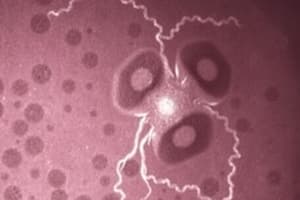Podcast
Questions and Answers
All cells are derived from pre-existing cells.
All cells are derived from pre-existing cells.
True (A)
What are the three major stages of the cell cycle?
What are the three major stages of the cell cycle?
- Interphase, Prophase, Anaphase
- Interphase, Cytokinesis, Mitosis
- Interphase, Metaphase, Telophase
- Interphase, Mitotic Stage, Cytokinesis (correct)
What must happen to DNA before cell division?
What must happen to DNA before cell division?
DNA must be replicated.
What type of reproduction involves a single cell dividing to make two identical daughter cells?
What type of reproduction involves a single cell dividing to make two identical daughter cells?
What is a zygote?
What is a zygote?
Mitosis is an example of sexual reproduction.
Mitosis is an example of sexual reproduction.
Describe the structure of prokaryotic DNA.
Describe the structure of prokaryotic DNA.
How do prokaryotes divide?
How do prokaryotes divide?
Study Notes
Cell Reproduction
- All cells are derived from pre-existing cells.
- New cells are produced for growth and to replace damaged or old cells.
- Cell reproduction processes differ in prokaryotes (bacteria) and eukaryotes (protists, fungi, plants & animals).
The Cell Cycle
- The cell cycle is an orderly sequence of stages from the first division to the time the resulting daughter cells divide.
- Just prior to the next division, the cell grows larger, the number of organelles doubles, and the DNA is replicated.
- The three major stages of the cell cycle:
Interphase
- Many stages including G1 (growth), S (growth and DNA replication), G2 (growth and final preparations for division)
- G1 checkpoint: The main checkpoint of the cell cycle.
- G1: If DNA is damaged, apoptosis will occur. Otherwise, the cell is committed to divide when growth signals are present.
- G2 checkpoint: G2 mitosis will occur if DNA has replicated properly. Apoptosis will occur otherwise.
Mitotic Stage
- The stage where the cell divides into two identical daughter cells.
Cytokinesis
- The stage where the cytoplasm divides, separating the two new cells.
- Many stages including G1 (growth), S (growth and DNA replication), G2 (growth and final preparations for division)
Keeping Cells Identical
- The instructions for making cell parts are encoded in the DNA, so each new cell must get a complete set of the DNA molecules.
DNA Replication
- DNA must be copied or replicated before cell division.
- Each new cell will then have an identical copy of the DNA.
Types of Cell Reproduction
- Asexual reproduction involves a single cell dividing to make 2 new, identical daughter cells.
- Mitosis & binary fission are examples of asexual reproduction.
- Sexual reproduction involves two cells (egg & sperm) joining to make a new cell (zygote) that is NOT identical to the original cells.
- Meiosis is an example.
Prokaryotic Chromosome
- The DNA of prokaryotes (bacteria) is one, circular chromosome attached to the inside of the cell membrane.
Cell Division in Prokaryotes
- Prokaryotes such as bacteria divide into 2 identical cells by the process of binary fission.
- The single chromosome makes a copy of itself.
- A cell wall forms between the chromosomes dividing the cell.
Studying That Suits You
Use AI to generate personalized quizzes and flashcards to suit your learning preferences.
Related Documents
Description
Explore the intricate processes of cell reproduction and the cell cycle. This quiz covers the differences in cell reproduction for prokaryotes and eukaryotes, as well as the stages of the cell cycle, including interphase and critical checkpoints. Test your knowledge on how cells prepare for division and their growth phases.





